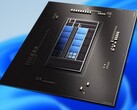It’s important to state from the outset that UserBenchmark is considered to be an extremely unreliable and controversial benchmark site with scoring that is clearly more favorable to Intel CPUs over AMD processors. Arguably, the interesting news here is the actual spot of an Intel Core i9-12900 being tested, revealing its clock rates to be base of 2.4 GHz and boost of 4.25 GHz, and the revelation of the Asus ROG Maximus Z690 Extreme board. As the user in this case is based in Taiwan, it seems safe to presume someone from Asus accidentally leaked this result. The listing shows that the Z690 board supports 16 GB of DDR5 RAM (C8C1084S1UC48BAW model from the Micron Crucial brand) zipping along at 4.8 GHz.
The appearance of the Asus ROG Maximus Z690 Extreme board flexing its DDR5-supporting muscles should please gamers who have an eye on the next round of Intel’s product offerings. However, it would be remiss to conclude this article without commenting on the UserBenchmark entry for the i9-12900, regardless of the howls of derision it might elicit. The 8C+8c/24T Alder Lake CPU managed to produce an overall average bench of 114%, a 1-core score of 214 points, 2-core 410 points, 4-core 813 points, and 8-core 1,497 points. The 12th Gen Intel chip managed all of this on a 4.25 GHz boost clock and with a reported CPU throttling rate of 92%. It's worth remembering that UserBenchmark's weighted points system handily favors single-core benchmark results over those of multi-core tests.
Those figures can be put into greater perspective by comparing them (for the sake of curiosity as opposed to accuracy) with the Intel Core i9-11900K and AMD Ryzen 9 5950X, which can be seen in the table posted below. Keep in mind, the Alder Lake CPU listing offers theoretically maximum scores whereas the Rocket Lake and Zen 3 parts are based on the average taken from thousands of tests. Funnily enough, some media outlets have reported that even more can be expected from the Intel Core i9-12900, which differs from the i9-12900K by having a lower published power requirement of 65 W TDP rather than 125 W TDP. As an engineering sample, the i9-12900 should receive some more refinements and tweaks before it’s ready for the consumer market, where no doubt future UserBenchmark listings will show it achieving even higher record-breaking figures.
| Intel Core i9-12900 | Intel Core i9-11900K | AMD Ryzen 9 5950X | |
|---|---|---|---|
| Average bench | 114% | 109% | 101% |
| 1-core | 214 points | 187 points | 160 points |
| 2-core | 410 points | 370 points | 316 points |
| 4-core | 813 points | 700 points | 608 points |
| 8-core | 1,497 points | 1,245 points | 1,196 points |
| 64-core | 2,510 points | 1,740 points | 2,920 points |




























